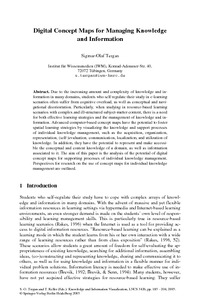Digital Concept Maps for Managing Knowledge and InformationZu finden in: Knowledge and Information Visualization (Seite 185 bis 204), 2005
|
 |
 Diese Seite wurde seit 1 Jahr inhaltlich nicht mehr aktualisiert.
Unter Umständen ist sie nicht mehr aktuell.
Diese Seite wurde seit 1 Jahr inhaltlich nicht mehr aktualisiert.
Unter Umständen ist sie nicht mehr aktuell.
 Zusammenfassungen
Zusammenfassungen
 Tergan outlines a conceptual model for the implementation of digital concept maps as tools for managing knowledge and information resources.
Tergan outlines a conceptual model for the implementation of digital concept maps as tools for managing knowledge and information resources. The contribution of Sigmar-Olaf Tergan titled "Digital concept maps for managing knowledge and information" aims to open up a new perspective of using concept maps in educational scenarios. The potential of digital concept maps for supporting processes of individual knowledge management is analyzed. The author suggests digital concept mapping as a visual-spatial strategy for supporting externalized cognition in resource-based learning and problem solving scenarios (Rakes, 1996).
The contribution of Sigmar-Olaf Tergan titled "Digital concept maps for managing knowledge and information" aims to open up a new perspective of using concept maps in educational scenarios. The potential of digital concept maps for supporting processes of individual knowledge management is analyzed. The author suggests digital concept mapping as a visual-spatial strategy for supporting externalized cognition in resource-based learning and problem solving scenarios (Rakes, 1996). Due to the increasing amount and complexity of knowledge and information in many domains, students who self-regulate their study in e-learning scenarios often suffer from cognitive overload, as well as conceptual and navigational disorientation. Particularly, when studying in resource-based learning scenarios with complex and ill-structured subject-matter content, there is a need for both effective learning strategies and the management of knowledge and information. Advanced computer-based concept maps have the potential to foster spatial learning strategies by visualizing the knowledge and support processes of individual knowledge management, such as the acquisition, organization, representation, (self-)evaluation, communication, localization, and utilization of knowledge. In addition, they have the potential to represent and make accessible the conceptual and content knowledge of a domain, as well as information associated to it. The aim of this paper is the analysis of the potential of digital concept maps for supporting processes of individual knowledge management. Perspectives for research on the use of concept maps for individual knowledge management are outlined.
Due to the increasing amount and complexity of knowledge and information in many domains, students who self-regulate their study in e-learning scenarios often suffer from cognitive overload, as well as conceptual and navigational disorientation. Particularly, when studying in resource-based learning scenarios with complex and ill-structured subject-matter content, there is a need for both effective learning strategies and the management of knowledge and information. Advanced computer-based concept maps have the potential to foster spatial learning strategies by visualizing the knowledge and support processes of individual knowledge management, such as the acquisition, organization, representation, (self-)evaluation, communication, localization, and utilization of knowledge. In addition, they have the potential to represent and make accessible the conceptual and content knowledge of a domain, as well as information associated to it. The aim of this paper is the analysis of the potential of digital concept maps for supporting processes of individual knowledge management. Perspectives for research on the use of concept maps for individual knowledge management are outlined. Dieser Text erwähnt ...
Dieser Text erwähnt ...
 Dieser Text erwähnt vermutlich nicht ...
Dieser Text erwähnt vermutlich nicht ... 
 Nicht erwähnte Begriffe | knowledge visualization, Kollektives Wissen, Mappingverfahren, Wissensrepräsentation |
 Tagcloud
Tagcloud
 Zitationsgraph
Zitationsgraph
 Zitationsgraph (Beta-Test mit vis.js)
Zitationsgraph (Beta-Test mit vis.js)
 Zeitleiste
Zeitleiste
 3 Erwähnungen
3 Erwähnungen 
- Second International Conference on Concept Mapping (Alberto J. Cañas, Joseph D. Novak) (2006)

- Interaktive Maps - Zugriffsinstrumente auf große Textmengen (Raja Gumienny) (2007)


- DeLFI 2008 - 07. - 10. September 2008 in Lübeck, Germany (Silke Seehusen, Ulrike Lucke, Stefan Fischer) (2008)
- Einsatz persönlicher Wissensnetze im Ressourcen-basierten Lernen (Doreen Böhnstedt, Philipp Scholl, Bastian Benz, Christoph Rensing, Ralf Steinmetz, Bernhard Schmitz) (2008)


- Einsatz persönlicher Wissensnetze im Ressourcen-basierten Lernen (Doreen Böhnstedt, Philipp Scholl, Bastian Benz, Christoph Rensing, Ralf Steinmetz, Bernhard Schmitz) (2008)
 Anderswo finden
Anderswo finden
 Volltext dieses Dokuments
Volltext dieses Dokuments
 |  Digital Concept Maps for Managing Knowledge and Information: Artikel als Volltext bei Springerlink ( Digital Concept Maps for Managing Knowledge and Information: Artikel als Volltext bei Springerlink ( : :  , 236 kByte; , 236 kByte;  : :  Link unterbrochen? Letzte Überprüfung: 2021-03-21 Letzte erfolgreiche Überprüfung: 2019-10-11) Link unterbrochen? Letzte Überprüfung: 2021-03-21 Letzte erfolgreiche Überprüfung: 2019-10-11) |
 Anderswo suchen
Anderswo suchen 
 Beat und dieser Text
Beat und dieser Text
Beat war Co-Leiter des ICT-Kompetenzzentrums TOP während er Dieser Text ins Biblionetz aufgenommen hat. Die bisher letzte Bearbeitung erfolgte während seiner Zeit am Institut für Medien und Schule. Beat besitzt kein physisches, aber ein digitales Exemplar. Eine digitale Version ist auf dem Internet verfügbar (s.o.). Aufgrund der vielen Verknüpfungen im Biblionetz scheint er sich intensiver damit befasst zu haben. Es gibt bisher nur wenige Objekte im Biblionetz, die dieses Werk zitieren.









 Cmap Tools
Cmap Tools E-Learning
E-Learning Lernen
Lernen Mind Map
Mind Map Visualisierung
Visualisierung Wissen
Wissen






 (
(





 Biblionetz-History
Biblionetz-History